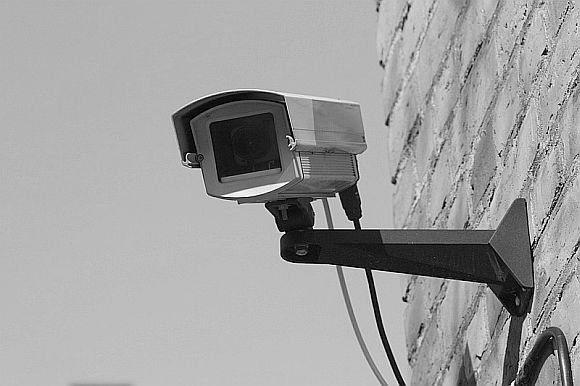
Lack of detailed legislation and stiff penalties, as well as low awareness among the general public about the pitfalls of being under surveillance, are some of the reasons behind the rising number of such instances
Blatant misuse of closed circuit TV cameras installed in retail shops, hotels and public places is a "de facto norm" in India, experts say. For the offence, cases of which are multiplying on a daily basis, one can take legal recourse under section 66E of the Information Technology Act, 2000. So far, however, there has been no reported conviction under the provision.
The issue has once again come to the fore after Union human resource development minister Smriti Irani spotted a camera allegedly pointing towards the trial room at a Fabindia showroom in Goa. The police have made several arrests in the matter. It is also planning to question the retail firm's chief executive and managing director, William Bissell.
Cyber law experts say several cases of installed CCTV cameras violating privacy are emerging, be it cameras installed in cabins of employees, in changing rooms of malls or in public and private bathrooms. Recently, an 18-year-old employee of a popular lounge and bar in Mumbai was arrested after he was found videotaping women in the toilet, through a mobile phone taped to the wall. There are instances of such violations on a routine basis in hotel rooms of honeymooners, which find their way to porn footage on the internet.
Lack of detailed legislation and stiff penalties, as well as low awareness among the general public about the pitfalls of being under surveillance, are some of the reasons behind the rising number of such instances. The fact that India neither has a detailed data protection law nor a privacy law only amplifies the concern.
"Digital voyeurism is increasingly dramatically in India because of the proliferation of mobile phones with cameras and the easy availability of spy cameras. A quick survey of Indian pornography online will confirm most of it is doubly illegal - because production of pornography is illegal and because it has been produced as a result of digital voyeurism," says Sunil Abraham, executive director of the Centre for Internet & Society, a Bengaluru-based think tank. Massive consumption and circulation of these clips result in the rights of women being infringed again and again, he adds. "It is a terrible situation."
The IT Act, 2000, is the parent legislation to deal with electronic surveillance. If a camera captures images of the private parts of a person, male or female, or transmits such images without consent, the offender can be booked under section 66E.
However, the provision is a "toothless wonder", as it is a bailable offence, with only three years of imprisonment and a fine of Rs 2 lakh, says cyber law expert and Supreme Court advocate Pavan Duggal. He adds since there are no clear guidelines on how to capture (the format), preserve (the duration) and present the CCTV camera footage, investigations into such crimes aren't done properly, leading to no convictions so far.
"Our law is patently wanting because this is not the first time this has happened; cases are being reported every now and then. The lack of quantified damages emboldens the offender," says Duggal.
Under the IT Act, if a camera captures obscene electronic information, the owner of a CCTV camera can be booked under section 67, but if the camera captures sexually explicit information, it is classified as a non-bailable offence under section 67a, entailing five years of imprisonment and a fine of Rs 10 lakh.
There are instances of CCTV cameras being installed in schools, which is a bigger issue, as it might tantamount to child pornography.
A few months ago, a CCTV camera installed at a public place captured a couple making love. In another case, a camera captured a couple kissing in the Delhi metro. The footage of both found their way to the internet.
"In today's times, CCTVs are an absolute must. So, legislation will have to strike a balance between privacy and security," says Duggal. He adds detailed guidelines are required on the responsibilities of CCTV camera owners as far as due diligence is concerned, as they are classified as intermediaries under the IT Act. Also, the extent of the liability in cases of leak of sensitive information or footage has to be specified.
The privacy law, which has been at the drafting stage since the past five years, aims to have a separate chapter on surveillance, detailing the dos and don'ts for CCTV cameras. Abraham says, "The passage of a privacy Bill by the Parliament will ensure internationally accepted privacy principles will be implemented in the letter of the Indian law." This will ensure citizens have rights that they can enforce against corporations and government agencies using CCTV cameras, adds Abraham, an active participant in framing some drafts of the privacy law.







 © 2025
© 2025